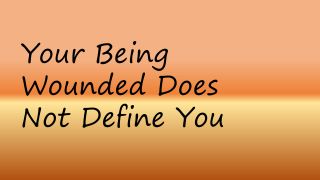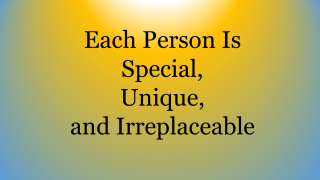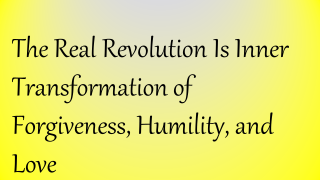Forgiveness
What You Might End up Learning About Humanity as You Forgive
Here are 6 insights into humanity that forgiving others can bring out.
Posted July 26, 2023 Reviewed by Davia Sills
Key points
- Societies tend to foster certain views of what humanity actually is, such as judging people by behavior only.
- Forgiveness challenges people to change themselves from within first and then change societies for the better.
- The inner transformations of forgiveness, humility, and love may create startlingly positive changes.
When I began studying the psychology of forgiveness in 1985, my focus was on trying to define what forgiveness is and is not. I came to realize that to forgive is to strive to be good to those who are not good to us. We take this stance without excusing unfair behavior, without forgetting so that it does not happen again, without automatically reconciling if the other's behavior is dangerous to us, and without abandoning a quest for justice.
As I grew in my understanding of forgiveness, my perspective of the world, particularly of persons, began to grow and become more refined. It is this set of insights, which took years to develop, that I share with you now. Consider six insights into humanity that I see as consistent with living a forgiving life.
1. Wounding Others Does Not Define the Person.
I came to know that as we forgive, we strive over time to start seeing that those who deeply hurt us often have been wounded by others. This does not at all excuse the unfair behavior, but it does add a dimension regarding who this person is—a wounded person.

2. Being Wounded Does Not Define You.
Too often, our research team has found this: When treated very badly by other people, the wronged person can begin to believe the lie and start the inward conversation that the self is not so good. "How could I be good if someone (or others) decided to treat me so cruelly?" These statements seem to characteristically develop in those who are abused, and yet they are a complete lie toward the self.
The one treated badly needs to resist the false conclusion that the self is worthless because of symptoms of trauma such as anger, anxiety, or depression. It takes time and effort to reverse the negative self-statements connected with being wounded and feeling bad, then followed by self-condemnation. Yet, negative self-statements are important to overcome because they are untrue.
3. Self-loathing Is a Lie.
Similar to point number two, when a person is in need of self-forgiveness because of breaking their own moral standards, too often, the person equates the self with the action. The result is self-loathing or an incessant self-condemnation that stays with a person as part of one's own sense of identity. When I wrote an essay on this site regarding self-loathing and self-forgiveness, I was surprised by the very large number of people who were reading it.
In other words, self-loathing in need of self-forgiveness is apparently too common. If you have the audio-recorder going in your mind and on repeat that you are less than human, less than you ought to be, then the practice of self-forgiveness likely will lead to the fading of that audio message within you. This is important because self-loathing is a lie.

4. Loathing Others Is a Distortion of Reality Because All People Have Inherent Worth.
I can hear some readers says this: "But, there are acts so horrendous that a person has lost the right even to life itself. The death penalty across time and cultures is proof enough that not all human life has value."
Yet, as Aristotle reminds us, there is a difference between current actions and the potential for good actions. Because of free will, and even because of excellent rehabilitation programs, a person's current behavior is not the final word on their potential for possible change for the better. All people possess the potentiality to grow in their humanity and so each has the built-in value of personhood, of possessing inherent worth that cannot be earned or taken away.
The person who has behaved badly, I came to learn, is as special, unique, and irreplaceable as are all other human beings. It can take time to have this insight settle into the mind because we so often define people by their behavior, especially those whose behavior is unacceptable. Thus, when a person is loathed by others, the distinction needs to be made between the actions that are deemed unacceptable and who the person is who behaved this way. The loathing of the person robs them of their inherent worth and possibly creates unrest and an abiding resentment within the one doing the judgement of the other person(s).

5. Positive Social Change Originates Within People, Not First by Changing Societal Structures.
A current trend across the world that has been prominent for at least the past 170 years is this: If we want a more harmonious world, then we have to change, and even tear down, existing social structures that are deemed to be unfavorable or unjust. We see this in the revolutionary spirit of hoping for a better world by pushing others aside who are seen as responsible for the less than favorable social conditions. Yet, I have come to realize that true change comes first by the interior transformation of each person, from hatred to forgiveness, from lust to dominate to humility, from disrespect to love. The inner transformations then can lead societal change, and yet this is rarely seen and almost never tried.
For example, when was the last time you heard someone say, “Let us try to create a fair and forgiving community by fostering a deep and accurate sense of the moral virtues of justice and forgiveness in the hearts of people. We then can ask how to be fair and forgiving with one another”? I have yet to hear of such a program. Instead, I hear constantly about loathing others and pushing them aside.
With what are we left if those who succeed in pushing the others aside do so with consistent disrespect for persons, with a confident judgement that not all persons have inherent worth? How long have such social experiments lasted as revolution settles in with control, force, and disrespect? We need forgiveness education... now.
6. People Need Time to Grow in Their Moral Virtues and So Patience Is Necessary.
People need time to grow in the moral virtues, and this includes forgiveness. We cannot rush this process, but give people time to adjust to the ideas above as they willingly practice forgiving those who have hurt them, alongside the moral virtues of justice and humility for a more humane world. So, be gentle and patient with yourself as you move forward with forgiving.




